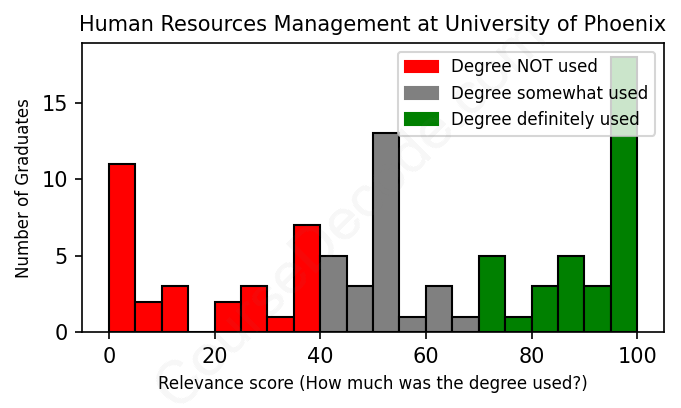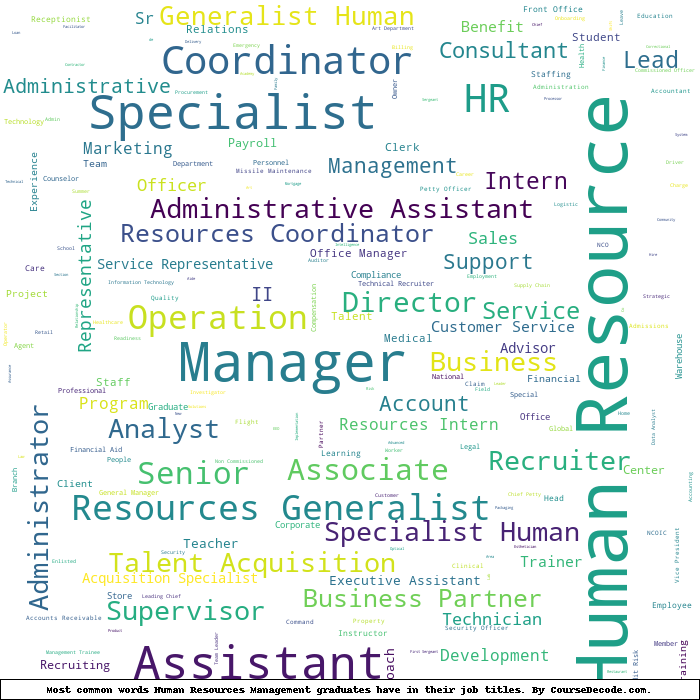
First, some facts. Of the Human Resources Management graduates from University of Phoenix we've analyzed , here's how many have used (or NOT used) their degree in their career:

These are estimates based on AI analysis of 90 LinkedIn profiles (see below).
The verdict? Significantly below average. Overall, with an average relevance score of 55%, Human Resources Management graduates from University of Phoenix have a much lower likelihood (-12%) of finding work in this field compared to the average graduate across all fields:
And for comparison, here's the chart for all profiles we've looked at across all degrees.
Also, after graduating, only 22% of these graduates have pursued further education other than another Bachelor's degree (such as a Masters degree or other), compared to the average across all profiles of 35%. This suggests a Bachelors degree is enough for most Human Resources Management graduates, and it's normal to look for work straight after graduation.
See the details:
|
Relevance score: 30% We think this person has NOT gone into a career related to their degree. We think this person has NOT gone into a career related to their degree.
DEGREE INFOGraduated in 2018 from University of Phoenix with a Bachelor of Science in Business in Human Resources Management. No other secondary education since. JOB HISTORY SINCE GRADUATIONLoan Operations Specialist OneMain Financial Jul 2019 - May 2021 Regional Sales Manager  Iboco Corp Oct 2021 - Mar 2024 Sales Specialist  Wesco Mar 2024 - Present ABOUTYou can have everything in life you want, if you will just help enough other people get what they want. -Zig Ziglar |
The top 10 most common jobs done by the graduates we've analyzed (ranked most common to least) are:
Analyzing the job trajectories of individuals who graduated with a degree in Human Resources Management from the University of Phoenix reveals a mixed bag of employment outcomes. Many of these graduates have found themselves in roles that are either directly related to human resources or in positions where their skills may not be fully utilized. Common job titles among these individuals reveal a significant focus on HR-related roles such as Human Resources Manager, HR Generalist, and HR Coordinator. These positions are notably aligned with the skills and knowledge expected from their academic training, validating the relevance of their degrees.
However, a significant number of individuals have taken on roles that are only tangentially related to Human Resources Management or not related at all. Positions such as Administrative Assistant, Clerical Assistant, or roles in fields like sales, customer service, and even logistics dominate the landscape. For instance, clerical or administrative roles often require general organizational skills but do not necessitate a solid grounding in HR principles, suggesting that while these graduates may secure jobs quickly, those roles may not fully leverage their education. This divergence hints at a potential issue within the job market for HR graduates, where the availability of HR-specific roles may not be as abundant as desired.
Ultimately, while there are undoubtedly successful placements in relevant HR positions, the breadth of job types indicates that many individuals are not directly applying their specialized training every day. This imbalance raises questions about industry readiness and the alignment of academic programs with real-world job demand. It also highlights the importance of networking and gaining relevant experience during and after studies to secure more HR-focused employment. Graduates may benefit from additional job-search strategies or skill enhancement to better position themselves in a competitive market.
Here is a visual representation of the most common words in job titles for Human Resources Management graduates (this is across all Human Resources Management graduates we've analyzed, not just those who went to University of Phoenix):

When analyzing the career trajectories of graduates from the University of Phoenix who have a degree in Human Resources Management, it becomes clear that their journeys can vary widely, but there are some common themes. For many graduates, the immediate post-graduation phase often involves taking on entry-level positions that may not completely align with their degree but are in related fields. For instance, early jobs include roles like clerical assistant or administrative positions, which serve as stepping stones while gaining relevant experience that can eventually lead to more significant HR roles.
As we look at the five to ten-year mark, a noticeable trend shows many graduates progressing into more specialized HR roles. Positions like Human Resources Manager, Director, or Coordinator seem quite common. This trajectory signifies growth and a deeper involvement in the HR field. However, not all paths are linear. Some graduates have shifted significantly away from HR entirely, tapping into various fields, such as sales, operations, or even entrepreneurship in independent ventures. This suggests that while a degree in HR Management provides a solid foundation, some individuals might opt for alternative career routes that leverage their skills in different contexts.
Overall, the general outlook for these graduates is positive regarding relevant career growth in human resources. Many do successfully transition from their first jobs into more meaningful roles within HR, particularly those who focus on continuous professional development and networking. However, there is also a significant number that drifts into unrelated job sectors after graduation, which might highlight personal interests or the influence of job market conditions. It’s a mixed bag, but with persistence and dedication, numerous graduates have carved out satisfying careers in human resources.
Getting a Bachelor’s degree in Human Resources Management at the University of Phoenix is generally considered to be on the easier side compared to some other degrees, but it still requires a decent amount of effort. The coursework usually focuses on practical knowledge and skills rather than heavy theoretical stuff, which makes it a bit more manageable for students who are organized and motivated. You’ll tackle topics like employee relations, organizational behavior, and labor law, which can be interesting if you’re into people and how organizations work. While it’s not a walk in the park, if you stay on top of your assignments and participate, you’ll likely find it doable. Overall, if you’re thinking about it, just know that while it’ll have its challenges, it's generally considered more approachable than some more technical or math-heavy degrees.
Most commonly, in the LinkedIn profiles we've looked at, it takes people 3 years to finish a Bachelor degree in Human Resources Management.
So looking at the job history of these University of Phoenix grads, there are definitely mixed signals about their earning potential over the years. Some of them started off in basic positions like clerical assistants or temporary roles, which typically don’t pay well. For instance, the person who transitioned to various HR roles took quite a few short-term positions before landing a more stable job as a Human Resources Manager. It seems like they may have climbed the ladder, but early on, it’s likely they weren’t making much. Looking at their later roles, though, many of them do appear to land decent positions that likely come with better pay as they advance in the HR field, suggesting that persistence can pay off if you keep building on your experience.
On the flip side, some graduates, like those who remained in HR roles for a long time or moved into management or specialized roles, seem to be doing quite well. Positions like HR Director or Senior Analysts usually come with decent salaries, and if those positions are in stable companies or growing fields, they could be making a nice income. Overall, it looks like a lot of these grads have the potential to make good money later in their careers, but it probably took some time and effort to move up from those entry-level gigs. So for anyone just starting out, it’s a good reminder to keep pushing through the early jobs, because brighter opportunities might be just around the corner!
Here is a visual representation of the most common words seen in the "about" section of LinkedIn profiles who have a Bachelor degree in Human Resources Management (this is across all Human Resources Management graduates we've analyzed, not just those who went to University of Phoenix). This may or may not be useful:

Here are all colleges offering a Bachelor degree in Human Resources Management (ordered by the average relevance score of their Human Resources Management graduates, best to worst) where we have analyzed at least 10 of their graduates:
| College | Score | Count |
|---|---|---|
 San Jose State University San Jose State University
|
83 | 14 |
 Western Governors University Western Governors University
|
71 | 50 |
 Saint Leo University Saint Leo University
|
71 | 12 |
 Davenport University Davenport University
|
71 | 11 |
 Capella University Capella University
|
70 | 15 |
 Rutgers University Rutgers University
|
67 | 14 |
 Southern New Hampshire University Southern New Hampshire University
|
66 | 30 |
 Lindenwood University Lindenwood University
|
64 | 11 |
 DeVry University DeVry University
|
63 | 31 |
 University of Maryland Global Campus University of Maryland Global Campus
|
61 | 22 |
 Upper Iowa University Upper Iowa University
|
61 | 12 |
 Columbia Southern University Columbia Southern University
|
59 | 28 |
 Central Michigan University Central Michigan University
|
57 | 15 |
 Colorado Technical University Colorado Technical University
|
57 | 16 |
 American InterContinental University American InterContinental University
|
56 | 24 |
 University of Phoenix University of Phoenix
|
55 | 90 |
 Ashford University Ashford University
|
52 | 36 |
 American Military University American Military University
|
52 | 13 |
 Park University Park University
|
52 | 21 |
 University of Maryland University College University of Maryland University College
|
51 | 15 |
 Strayer University Strayer University
|
47 | 31 |